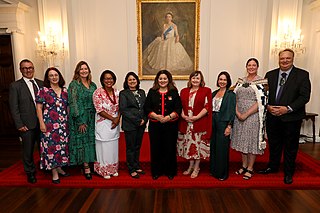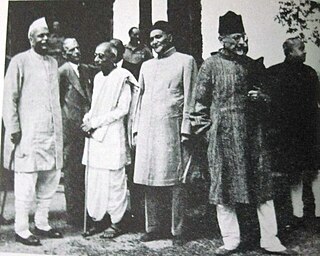| |||||
| Centuries: | |||||
|---|---|---|---|---|---|
| Decades: | |||||
| See also: | List of years in India Timeline of Indian history | ||||
Events in the year 1864 in India.
| |||||
| Centuries: | |||||
|---|---|---|---|---|---|
| Decades: | |||||
| See also: | List of years in India Timeline of Indian history | ||||
Events in the year 1864 in India.

A viceroy is an official who reigns over a polity in the name of and as the representative of the monarch of the territory.

The governor-general of India was the representative of the monarch of the United Kingdom in their capacity as the Emperor/Empress of India and after Indian independence in 1947, the representative of the Monarch of India. The office was created in 1773, with the title of Governor-General of the Presidency of Fort William. The officer had direct control only over his presidency but supervised other East India Company officials in India. Complete authority over all of British territory in the Indian subcontinent was granted in 1833, and the official came to be known as the "Governor-General of India".

Sir Syed Ahmad Khan, also spelled Sayyid Ahmad Khan, was an Indian Muslim reformer, philosopher, and educationist in nineteenth-century British India.

Shimla is the capital and the largest city of the northern Indian state of Himachal Pradesh. In 1864, Shimla was declared the summer capital of British India. After independence, the city became the capital of East Punjab and was later made the capital city of Himachal Pradesh. It is the principal commercial, cultural and educational centre of the state.

John Laird Mair Lawrence, 1st Baron Lawrence,, known as Sir John Lawrence, Bt., between 1858 and 1869, was a prominent British Imperial statesman and served as the Viceroy of India from 1864 to 1869.
Events in the year 1869 in India.
Events in the year 1875 in India.

The Indian Councils Act 1909, commonly known as the Morley–Minto or Minto–Morley Reforms, was an act of the Parliament of the United Kingdom that brought about a limited increase in the involvement of Indians in the governance of British India. Named after Viceroy Lord Minto and Secretary of State John Morley, the act introduced elections to legislative councils and admitted Indians to councils of the Secretary of State for India, the viceroy, and to the executive councils of Bombay and Madras states. Muslims were granted separate electorates according to the demands of the Muslim League.

Sir John Strachey was a British civil servant and writer in India who served as Lieutenant-Governor of the North-Western Provinces from 1874 to 1876. He was briefly acting Governor-General in February 1872, before being replaced by the more appropriate Lord Napier who acted for the remainder of time until Lord Northbrook arrived.

Sir Courtenay Peregrine Ilbert, was a distinguished British lawyer and civil servant who served as legal adviser to the Viceroy of India's Council for many years until his eventual return from India to England. His later career included appointments as the First Parliamentary Counsel (1899–1902) and as Clerk of the House of Commons from 1902 to 1921.
Events in the year 1862
Theodore Beck was a Quaker and British educationalist working for the British Raj in India. From 1883 until his death in 1899 he was Principal of Muhammadan Anglo-Oriental College, which later became Aligarh Muslim University.
Events in the year 1920 in India.
Events in the year 1872 in India.
Events in the year 1866 in India.
Events in the year 1863 in India.

The Simla Conference of 1945 was a meeting between the Viceroy of India, Lord Wavell and the major political leaders of British India at the Viceregal Lodge in Simla. When it was clear that British intended to leave India, they desperately needed an agreement on what should happen when they leave.
Events in the year 1868 in India.
John Lawrence Island is an island of the Andaman Islands and belongs to the South Andaman administrative district, part of the Indian union territory of Andaman and Nicobar Islands. The island is 54 km (34 mi) northeast from Port Blair.

The Simla Deputation was a gathering of 35 prominent Indian Muslim leaders led by the Aga Khan III at the Viceregal Lodge in Simla in October 1906. The deputation aimed to convince Lord Minto, then Viceroy of india, to grant Muslims greater representation in politics.